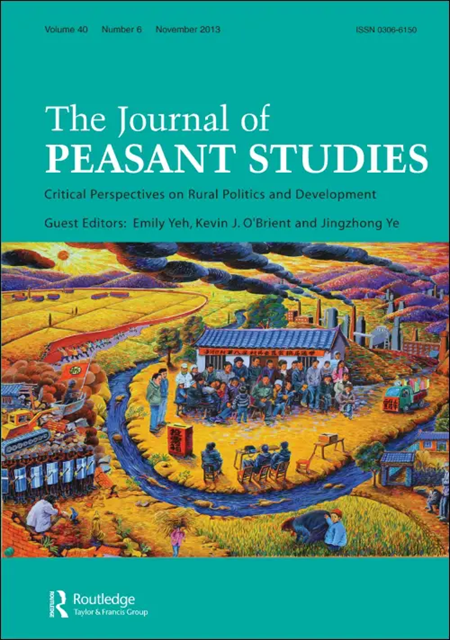Food sovereignty, food security and democratic choice: critical contradictions, difficult conciliations
IF 4.8
1区 社会学
Q1 ANTHROPOLOGY
引用次数: 254
Abstract
In recent years, the concept of ‘food sovereignty’ has gained increasing ground among grassroots groups, taking the form of a global movement. But there is no uniform conceptualization of what food sovereignty constitutes. Indeed, the definition has been expanding over time. It has moved from its initial focus on national self-sufficiency in food production (‘the right of nations’) to local self-sufficiency (‘the rights of peoples’). There is also a growing emphasis on the rights of women and other disadvantaged groups, and on consensus building and democratic choice. This paper provides a critique of some of the major tenets of the food sovereignty movement. It recognizes that many developing countries may wish to pursue the goal of self-sufficiency in the context of the global food crises, and that it is important to promote social equality and democratic choice. Taken together, however, there can be serious contradictions between the key features of the food sovereignty vision, such as between the goals of national and local food self-sufficiency; between promoting food crops and a farmer's freedom to choose to what extent to farm, which crops to grow, and how to grow them; between strengthening family farming and achieving gender equality; and between collective and individual rights, especially over land ownership. The paper also reflects on the ways in which some of the food sovereignty goals could be better achieved through innovative institutional change, without sacrificing an individual's freedom to choose.粮食主权、粮食安全和民主选择:关键矛盾,艰难调和
近年来,“粮食主权”的概念在草根团体中越来越受欢迎,并以全球运动的形式出现。但是对于食物主权的构成并没有统一的概念。事实上,随着时间的推移,这个定义一直在扩大。它已经从最初的关注国家粮食生产的自给自足(“国家的权利”)转变为地方的自给自足(“人民的权利”)。人们还日益强调妇女和其他处境不利群体的权利以及建立协商一致意见和民主选择。本文提供了一些粮食主权运动的主要原则的批评。它认识到许多发展中国家可能希望在全球粮食危机的背景下追求自给自足的目标,并认识到促进社会平等和民主选择是重要的。然而,总的来说,粮食主权愿景的关键特征之间可能存在严重矛盾,例如国家和地方粮食自给自足的目标之间;在推广粮食作物和农民自由选择耕种程度、种植何种作物以及如何种植之间;加强家庭农业与实现性别平等之间的关系;在集体权利和个人权利之间,特别是在土地所有权方面。本文还思考了在不牺牲个人选择自由的情况下,通过创新的制度变革更好地实现某些粮食主权目标的方式。
本文章由计算机程序翻译,如有差异,请以英文原文为准。
求助全文
约1分钟内获得全文
求助全文
来源期刊

Journal of Peasant Studies
Multiple-
CiteScore
10.50
自引率
17.60%
发文量
99
期刊介绍:
A leading journal in the field of rural politics and development, The Journal of Peasant Studies (JPS) provokes and promotes critical thinking about social structures, institutions, actors and processes of change in and in relation to the rural world. It fosters inquiry into how agrarian power relations between classes and other social groups are created, understood, contested and transformed. JPS pays special attention to questions of ‘agency’ of marginalized groups in agrarian societies, particularly their autonomy and capacity to interpret – and change – their conditions.
 求助内容:
求助内容: 应助结果提醒方式:
应助结果提醒方式:


